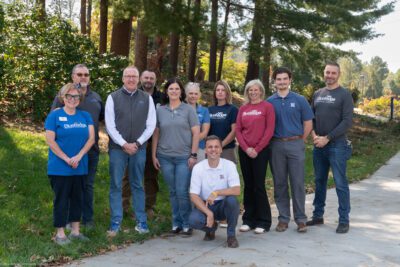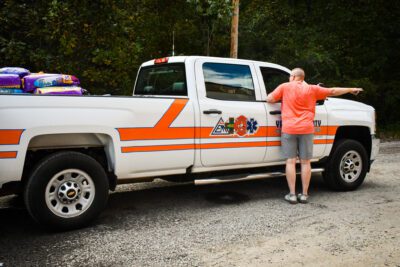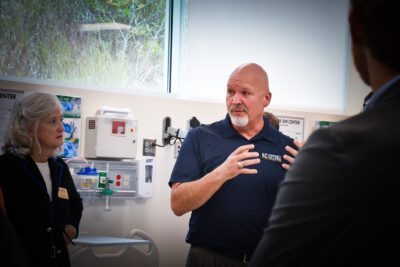
|
|
As the 14 North Carolina community colleges impacted by Hurricane Helene continue recovery efforts, the N.C. Community College System (NCCCS) is asking state lawmakers for student support funds and stabilization dollars due to enrollment loss, according to information presented at the State Board of Community College’s meeting on Oct. 18.
Alex Fagg, NCCCS vice president of government and external relations, did not share specific funding requests with the Board but said system staff has been in communication with the General Assembly, which is set to convene this Thursday, Oct. 24.
“We are in constant communication with the General Assembly about our recovery package,” he said. “We want to make sure we get students back into school so they can return to somewhat normalcy. …The other component that we have is looking at how do we support our colleges through stabilization dollars due to FTE (full-time equivalent) loss from the storm. This was done in Hurricane Florence.”
The system’s recovery package request was informed by requests following past hurricanes, Fagg said.
Following Hurricane Florence in 2018, the NCCCS received $18.5 million for disaster relief — including repairs and renovations — along with $6.4 million to offset FTE losses caused by the hurricane.
Of the $18.5 million allocated to the NCCCS for disaster relief, $5 million was required to go toward emergency grants for students. Those grants provided up to $1,250 to “eligible postsecondary students who have suffered financial hardship due to the damage and destruction from Hurricane Florence.”
On Friday, Fagg did not mention any specific requests for building repairs and renovations as part of the system’s Helene request. However, Fagg did mention a request concerning community support funds. These funds, he said, would be used to empower community colleges to meet local needs — similar to how Haywood Community College used state funds to help offer job training after the Canton paper mill closed.
“Our colleges are on the front lines of rebuilding communities,” Fagg said. “How do we look at the shifts of these economies — the temporary shifts, hopefully, of these economies — and make sure that we are providing for our communities?”
Following Helene, community colleges have played a critical role in recovery, according to a NCCCS press release.
“With 14 colleges affected by the storm, these community colleges quickly transformed into staging grounds and operational bases for disaster teams, emergency responders, power companies, and displaced residents,” the release said.
Asheville-Buncombe Technical Community College (A-B Tech), for example, sheltered nearly 200 displaced individuals in the immediate aftermath and provided medical assistance to 60 more people. Blue Ridge Community College is serving as a multi-functional recovery base, supporting local emergency services, along with search and rescue teams. Western Piedmont Community College staged 450 trucks and 750 personnel from Duke Energy to support extensive power restoration across the area.
And those are just a few examples included in the system’s release.
“Our colleges have always been pillars of support for North Carolina,” said NCCCS President Dr. Jeff Cox. “This response to Hurricane Helene showcases their ability to go above and beyond. These campuses are more than educational institutions — they are critical community centers for the communities they serve.”
Of the 14 North Carolina community colleges impacted by Hurricane Helene, most have since reopened. Just two community colleges — A-B Tech and Mayland — remain partially closed, with plans to reopen on Oct. 28.
Multiple Board members shared personal stories from Helene, including accounts of infrastructure damage across western North Carolina.
“Our colleges in the west are going to need support for an extended amount of time,” said David Heatherly, president of the N.C. Association of Community College Presidents.
During his report to the Board, Cox said that 15 system employees are in western North Carolina, helping with local recovery efforts. The system’s foundation has given $5,000 to each impacted college, Cox said, and the John M. Belk Endowment (JMBE) recently committed $2 million in funding.
The Hurricane Helene Community College Response and Recovery Fund, promoted by the NCCCS earlier this month, has also received $180,000, Cox said. On Friday, Board Chair Tom Looney said he would match any donations made by fellow Board members to that fund through Monday, Oct. 21.
“This was an extraordinary event. It’s going to take an extraordinary effort, and we have got to keep this in the news, in front of mind, not just for western North Carolina, but for our state and for our country,” Looney said. “We will not stop until the job is done.”
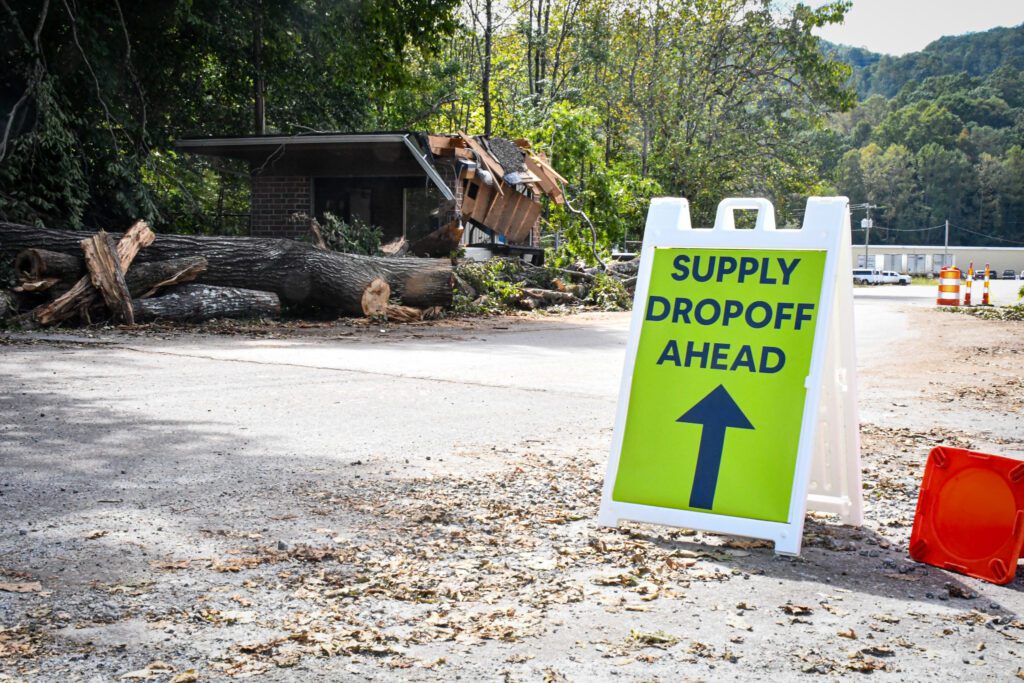
Other Helene policies
On Friday, the Board also voted to approve a waiver to Board code provisions due to Hurricane Helene.
That waiver allows impacted colleges to:
- Use excess bookstore revenue for repair projects not covered by insurance or FEMA reimbursements through spring 2026. Colleges can also use student activity fees to address Helene impacts through spring 2025.
- Enroll, distribute an academic credential, or issue a transcript to an impacted student with an outstanding balance for tuition, registration fees, or other monetary obligation arising as a result of Helene through spring 2026.
- Apply tuition paid by impacted students in fall 2024 to offset the tuition for courses of impacted students in spring 2025, summer 2025, fall 2025, or spring 2026 terms (if the student drops out of fall 2024 courses).
- Waive a prerequisite required by the Combined Course Library for an impacted student if the Chief Academic Officer or designee determines the impacted student has adequate prior knowledge to successfully perform in the course. This waiver will apply through the spring 2026 term.
“Many students have experienced significant storm related losses, impacting their ability to continue their education as planned,” the waiver says. “The State Board is requested to waive certain SBCC Code provisions in the public interest of promoting student retention and mitigating storm-related damage to colleges.”
Treasurer Dale Falwell also reminded Board members that it’s the last week of open enrollment for the new State Health Plan, which ends on Oct. 25, 2024.
However, for members in counties impacted by Helene, Falwell said that deadline has been extended until Nov. 1, 2024. You can learn more here.
Finally, Gov. Roy Cooper announced on Oct. 11 that North Carolina received approval from the U.S. Department of Labor for an initial grant of $10 million to provide jobs and training in areas severely impacted by Hurricane Helene.
In addition to providing temporary employment, the grant can also pay for workforce training at local community colleges.
“We look forward to using these resources to support disaster relief and recovery by connecting people who need work with organizations that need workers,” said N.C. Commerce Secretary Machelle Baker Sanders. “The challenges facing the communities of western North Carolina are immense, but our people are resilient, and together, we will rebuild.”
To apply for the Hurricane Helene dislocated worker grant program, residents should contact their local NCWorks Career Center. Contact information is available at www.ncworks.gov.
Enrollment growth and Propel NC
On Friday, Fagg also briefly discussed the system’s legislative requests for enrollment growth funding and the implementation of Propel NC.
In September, the Republican-led General Assembly passed a mini budget that included, among other things, $64 million for enrollment growth and $12.7 million in receipts for the community college system. Gov. Cooper vetoed the mini bill due to its expansion of private school voucher funding and requirement that local sheriffs cooperate with ICE.
Because the General Assembly has not yet voted to override the mini budget, colleges still don’t have enrollment growth funding — which is critical to planning their budgets for the spring semester.
“(Both) are on the forefront of our conversations as well,” Fagg told the Board after discussing Helene relief. “We’re looking for any opening there, but as of right now, it appears that would not be included in a disaster package.”
After Oct. 24, the General Assembly is also scheduled to meet Nov. 19-22 and Dec. 11-13. Fagg said he was hopeful a mini budget veto override would happen during one of those sessions.
On Friday, Finance Chair Lisa Estep said the committee would hold a special meeting if the veto is overridden to get enrollment growth funds to colleges as quickly as possible.
The mini budget did not include funds for Propel NC, the system’s new funding model proposal.
While both legislative chambers included some initial funding for the model in their budget proposals, the General Assembly adjourned before passing an adjustment budget.
Last month, Fagg said the system was working to implement Propel NC if funding is approved.
“This (planning) shows that we’re taking this seriously on what this means to the system as we prepare and leverage this in our continued advocacy efforts with the General Assembly as we lead into the 2025-27 legislative session, which will begin in January,” Fagg said. “This is the highest priority of our system.”
Other finance committee business
The finance committee also approved several allocations last week:
- $400,000 to four colleges for the Integrated Education and Training project, which provides adult education and literacy actives along with workforce preparation and training.
- An amount not to exceed $1 million for a twenty-month contract for Microsoft computing resource for data conversion, as part of the system’s ERP modernization efforts.
- $750,000 in high-cost workforce start-up funding and $1 million in high cost workforce expansion funding for health care workforce programs at four local community colleges.
- $2 million in Perkins carry-over funds from the 2023-24 academic year to the 2024-25 academic year “to be allocated to 56 community colleges to enhance their Career and Technical Education Programs.”
Rural partnerships
The Board’s October transformative discussion included an update on the system’s regional collaboration and rural strategy efforts.
Dr. Zach Barricklow, the system’s associate vice president for strategy and rural innovation, first presented to the Board in May. On Thursday, he briefed Board members on progress made to support rural colleges since then.
North Carolina has at least 46 rural community colleges, he said — the largest network of rural colleges in the United States. The system wants to support collaboration between rural community colleges, which he said play an “outsized role” in their communities.
“I think we’ve seen that very much play out over the last few weeks, since Hurricane Helene, the central role that our community colleges play in emergency response — completely apart from day-to-day educational programs,” Barricklow said. “These community colleges are sometimes the largest institutions in their region, and we want to help them thrive over the long haul. So that’s why we’re doing this work.”
The system’s regional collaboration is meant to result in specific recommendations to the Board, along with practitioner handbooks. The NCCCS-led project — named Rural Postsecondary Practices Partnership (RP³) — includes several partners: EdNC, the Belk Center for Community College Leadership and Research, and myFutureNC.
EdNC is participating with RP³ to share our lessons learned from our engagement and service journalism covering all 58 community colleges. EdNC retains its journalistic independence. Hannah Vinueza McClellan, our senior reporter, is not involved in the RP³ partnership.
“We believe maximum insight gathering is best accomplished in collaboration with aligned partners,” Barricklow said in May.
Since then, the RP³ group has identified and catalogued more than 100 rural partnerships across the NCCCS, with initial focuses on health care and advanced manufacturing.
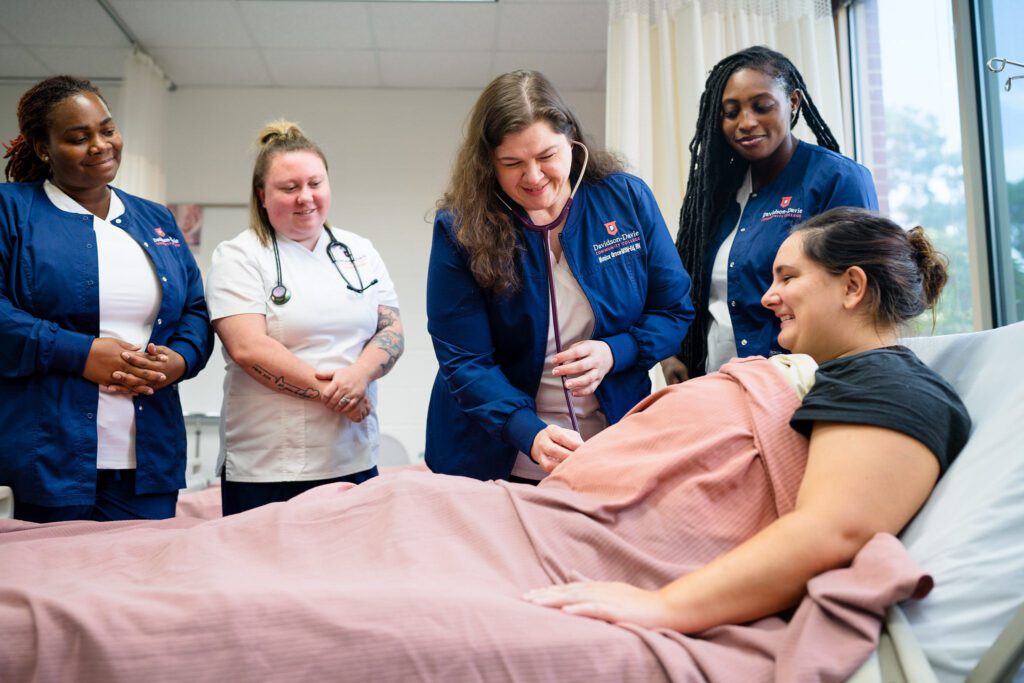
Barricklow shared a draft of the first rural health care partnerships toolkit with Board members on Thursday and said work on the advanced manufacturing guide is underway.
Partnerships in the health care toolkit include health care providers partnering to subsidize faculty salaries, colleges working together to jointly offer high-cost health care programs and camps, and the increase of registered apprenticeship programs.
“We did not have to look very hard at all to find hundreds of partnerships,” said Virginia McIlwain, RP³ researcher and consultant with East Third Group.
Between the health care and advanced manufacturing toolkits, McIlwain said all of the system’s rural colleges are represented in the work.
In the months ahead, RP³ wants to leverage networks to share their partnership toolkits, while also starting work on toolkits for other high-demand workforce sectors tied to Propel NC, along with toolkits for special student populations.
The group also aims to research long-term impact of promising practices on students, colleges, and communities.
“I believe this is organized in a way that, as a practitioner in a college, you can take this toolkit from the highest level and you can drill down as deep as you want to go,” Barricklow said of the draft health care toolkit. “There’s a lot in there, but I’m really proud of the quality of this work.”
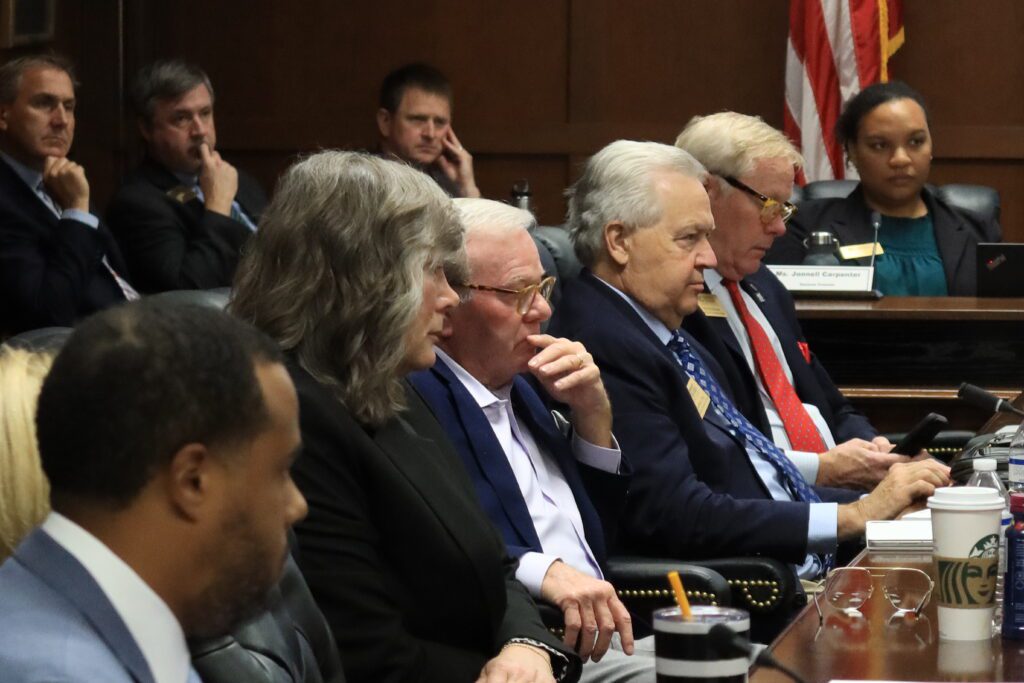
New president at Richmond CC and more
On Friday, the Board approved a new president at Richmond Community College. Brent Barbee, the current executive vice president and chief financial officer, will be the eighth president of the college, succeeding Dr. Dale McInnis who will retire Oct. 31.
“Brent will do a great job leading the College into a bright future,” McInnis said, according to a college press release. “He is the right man, for the right job, at the right time. Our college will be in good hands.”
The Board also voted to reelect Dr. Rusty Hunt, president of Lenoir Community College.
The Board discussed at length the 2024-25 system president’s performance plan and compensation document, which will lay out a plan for how to award Cox’s bonus. The bonus, which is based on progress made on the system’s five strategic goals, is up to $50,000 and will be voted on at the end of the fiscal year.
The compensation document will be voted on at a future meeting.
Here is a look at other business items from the meeting:
- The Board reviewed the Comprehensive Articulation Agreement between the NCCCS and UNC System institutions. According to that report, there was a nearly 5% increase in the number of new transfer students from the NCCCS in fall 2023, and a 6% increase in students transferring with an associate degree. The report ends with five recommendations to strengthen the transfer process, including “technological and operational solutions that create greater continuity, clarity, accessibility, and transparency for advising and the processing of transfer students.”
- The Board discussed recommendations for state performance measure changes, to be voted on at a future meeting. The document, endorsed by the N.C. Association of Community College Presidents, includes six recommendations.
- Finally, the Board discussed a 2024-25 operational plan review for the system, including updates on each of the system’s five strategic goals. According to the presentation, the system’s goal is to “deliver essential infrastructure, resources, and systems that enable North Carolina community colleges to increase the number of credential earners in high-demand workforce sectors in North Carolina.”
The Board meets next Nov. 14-15.
Editor’s note: The John M. Belk Endowment supports the work of EdNC.



